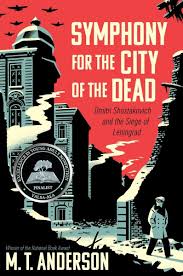The epic life of Dmitri Shostakovich and his music offers a window into the terror of Stalin’s purges and the cruelty of the Nazi blockade of his beloved Leningrad (St. Petersburg) during World War II. In Symphony for the City of the Dead, M. T. Anderson begins with Shostakovich’s early life and development, taking us step by step to the climactic composition and performance of The Leningrad Symphony in the midst of the city’s starvation.
 Along the way we see the narcissistic paranoia of Stalin that led him to kill millions of his own people–most of whom had not been anti-Soviet or anti-Stalin. His fear made him kill many of his own military officers as well, leaving a huge leadership vacuum when Hitler attacked that almost cost them the war.
Along the way we see the narcissistic paranoia of Stalin that led him to kill millions of his own people–most of whom had not been anti-Soviet or anti-Stalin. His fear made him kill many of his own military officers as well, leaving a huge leadership vacuum when Hitler attacked that almost cost them the war.
During those pre- and post-war purges, Shostakovich survived as many did by attempting to play a life-and-death game of agreeing with the powers that be while composing mostly as he wanted. Though he did not try to defend himself much and seemed often to capitulate, he endangered himself by using his notoriety to advocate for friends and family who had been arrested.
The story of the siege of Leningrad is horrific and graphic–people eating shoe-leather, leaves, wallpaper paste and each other in desperate attempts to survive. Yet, amazingly, the symphony was written and then smuggled out on microfilm and played around the world in the early months of 1942 giving hope to the Allied nations when the Nazi’s seemed invincible.
Even more amazingly, the symphony was performed in Leningrad itself in August 1942, with the city still surrounded. Musicians could barely play and even fainted from hunger during rehearsals. The military initiated an offensive on the other side of the city so the performance could go on uninterrupted.
M. T. Anderson is a well-know author of excellent juvenile fiction. Though this book is labeled juvenile non-fiction, it is an fine example of narrative non-fiction on par with McCullough and Meacham.
I confess I have never been fond of the music of Shostakovich, it being too abstract for my taste. But M. T. Anderson’s tour de force compelled me to listen to the Leningrad Symphony multiple times. Each time I found it to be every bit as powerful as the story behind it.
Next: Why Hitler Lost
